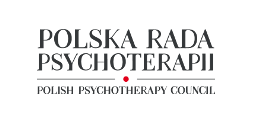The most important definitions concerning psychotherapy, the training process and the principles of psychotherapist certification in Poland. More information can be found in the “Psychotherapy Manual”.
Psychotherapist certificate
a document that confirms a psychotherapist’s competence and skills acquired in the course of comprehensive specialist post-graduate training in psychotherapy, as well as fulfilment of requirements (such as passing an exam external to the training entity and completing a clinical work placement) specified in the internal certification procedures of the professional association of which the psychotherapist involved is a member.
Psychotherapy supervisor certificate
a document confirming that a psychotherapist is qualified to support and supervise the work of other psychotherapists. The supervisor certificate is granted by the professional association that the psychotherapist is a member of, after fulfilling the requirements specified in certification procedures.
Psychotherapeutic modality / Psychotherapeutic approaches
a paradigm that finds confirmation in research and clinical experience; synonymous terms: method, approaches in psychotherapy. It is the way of conducting psychotherapy and its specific tenets taught in the schools of a given modality. The main groups of psychotherapeutic approaches include psychoanalytic-psychodynamic, cognitive-behavioural, humanistic-experiential, systemic and integrative psychotherapy. Their effectiveness has been confirmed by research.
Polish Psychotherapy Council (PRP)
an organisation of associations operating in Poland, which accredit or conduct post-graduate systematic and comprehensive training in psychotherapy and have certification procedures for obtaining a certificate or its equivalent. The aim of PRP is to ensure maintenance of high standards in psychotherapist education and psychotherapeutic practice in Poland. For over 10 years, PRP has been actively involved in preparing and evaluating legislative solutions concerning mental health, psychotherapy and the profession of psychotherapist.
Psychotherapist
a graduate of specialist comprehensive post-graduate training in psychotherapy, lasting at least 4 years (training standards have been specified by the Polish Psychotherapy Council: at least 1200 hours of theoretical and practical training, including personal therapy, supervision and a clinical placement). A psychotherapist (also a psychotherapist in training) may provide individual, group, marital/couples and family psychotherapy to patients with diverse diagnoses. In order to undertake a specialist post-graduate training in psychotherapy, a master’s degree is required. After obtaining confirmation of completing a comprehensive post-graduate training in psychotherapy and after meeting some additional requirements, a psychotherapist may apply in the professional association of which he or she is a member for a document called a psychotherapist certificate. Neither graduating in medicine or psychology, nor a specialisation in psychiatry or clinical psychology prepare for conducting psychotherapy. It is a separate profession, different than that of a psychologist, clinical psychologist, psychiatrist, specialist in addiction psychotherapy, or community therapist.
Psychotherapist in training
a participant of specialist comprehensive post-graduate training in psychotherapy, lasting at least 4 years (training standards have been specified by the Polish Psychotherapy Council: at least 1200 hours of theoretical and practical training, including personal therapy, supervision and a clinical placement). A psychotherapist in training or a psychotherapist in the process of certification may provide supervised individual, group, marital/couples and family psychotherapy to patients with diverse diagnoses.
Psychotherapy
deliberate and planned psychological intervention that aims at mitigating or removing the symptoms of a disorder, and/or improving psychological and social functioning, and that supports the individual or family in the pursuit of health and development. The main groups of psychotherapeutic approaches include psychoanalytic-psychodynamic, cognitive-behavioural, humanistic-experiential, systemic and integrative psychotherapy, and their effectiveness has been confirmed by scientific research. Psychotherapy is a distinct, autonomous discipline. It may be practised only by those who have relevant specialist education or are in the course of such training (see Psychotherapy training). Higher education, e.g. in psychology or medicine, as well as specialisation in clinical psychology or in psychiatry, do not prepare for conducting psychotherapy.
Psychotherapy supervisor
a psychotherapist with more extensive professional experience, who monitors the psychotherapeutic process conducted by a psychotherapist or group of psychotherapists. The supervisor helps the psychotherapist(s) to conceptualise the patient’s problem and choose appropriate techniques or methods of working with him/her. Most Polish Psychotherapy Council member associations grant psychotherapy supervisor certificates.
Training in psychotherapy
comprehensive post-graduate training in psychotherapy, which lasts at least 4 years and meets the standards developed by the Polish Psychotherapy Council (see Psychotherapist). After completing training and fulfilling additional requirements, the psychotherapist may apply in the professional association of which he/she is a member for a document called a psychotherapist certificate.
PRP’s goals
Caring for the status and legitimacy of the psychotherapeutic profession. Supporting the growth of psychotherapy in Poland. Developing and consulting draft legislative solutions as regards training and certifying psychotherapists and providing psychotherapeutic care…more
Register of psychotherapists
The list will present information about psychotherapists with qualifications confirmed by the Polish Psychotherapy Council – Federation of Associations member organisations… more
Cooperation since 2006
The aim of the Polish Psychotherapy Council (PRP) is to ensure maintenance of high standards in psychotherapist education and psychotherapeutic practice in Poland. Since 2006 PRP has been actively involved in preparing and evaluating legislative solutions concerning mental health, psychotherapy and the profession of psychotherapist.
Please contatct us
You are welcome to address any questions related to the field of psychotherapy.
